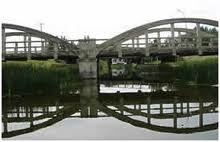July 1 marks a tragic anniversary in the Northwest.
It was 10 years ago on that date that the resort village of Cochin was the scene of a horrific car crash involving a vehicle driven by Norma Jean Mooswa. Her vehicle crashed into a line of vehicles at an intersection.
Six people were killed - four in her own vehicle and two in the Toyota Echo she hit in front of her. Four others were injured in the collision, which happened at an intersection on Highway 4 near the resort village.
The car was alleged to have been clocked at 160 km/h at the time of the crash. Mooswa was behind the wheel, despite the fact she was already under a suspension due to previous drunk driving convictions.
In December of that year, Mooswa pled guilty to six counts of impaired driving causing death and four counts of impaired driving causing bodily harm.
She was sentenced to 10 years in jail, at the time the longest sentence ever imposed in an impaired driving case in Canada.
But controversy soon followed during her jail sentence. Mooswa was transferred to a minimum-security healing lodge in the southwest of the province, and applied for and was granted temporary day passes from the facility.
She later applied to the parole board on two occasions for "unescorted temporary absences." She was turned down, but Mooswa's attempts at freedom raised unpleasant memories for family members of victims of the crash, who raised their concerns that Mooswa's punishment was too light.
In spite of the families' opposition, in 2011 Mooswa was granted early release by the parole board, three years before her sentence was up, with several conditions imposed.
The scars of that incident, and other impaired driving incidents within the Northwest region, are not soon forgotten as evidenced by the notable and vocal activism against drunk driving in the area. That includes efforts by the local Students Against Driving Drunk group to raise awareness of the issue in the Battlefords.
Recently, the issue has been a focus of provincial legislators on both sides of the aisle in the legislature.
The government recently brought in tougher penalties cracking down on drunk driving, in the wake of traffic safety committee recommendations made last year.
As of June 27, the new sanctions include, for new drivers, 60-day immediate roadside license suspensions and three-day immediate roadside vehicle impoundment for first offenders; 120-day suspension, seven-day impoundment and voluntary interlock for second offences; and 18-month roadside suspension for third and subsequent offences.
For experienced drivers with readings between .04 and .08 BAC, there are three-day immediate license suspensions for a first offence, a 21-day immediate roadside suspension for second offences and seven-day vehicle impoundment for second offences. For third and subsequent offences there is 90-day immediate roadside suspensions, 14-day vehicle impoundment and mandatory interlock for a year.
Those are part of a wider effort targeting traffic offences in general, including increased enforcement and the increase in use of photo radar in communities in the province.
In a recent interview with the News-Optimist, Dennis Cann, who was Crown prosecutor in the Mooswa case, noted the entire issue of drinking and driving is one that people in the province can relate to.
"Most everybody would know somebody that they know who was involved or maybe killed in a car accident, or had a drunk driver hit somebody," said Cann.
He cited the Mooswa case, one he was involved in prosecuting in 2004, as a notable one, pointing to the precedent-setting 10-year sentence.
"Unfortunately, it takes serious cases like that to start changing things," said Cann.
He noted there have been harsher sentences imposed since the Mooswa case, and believes politicians are also responding more strenuously to the issue of drunk driving.
"Politicians, they're human," notes Cann, who says their response to the publicity and calls from those concerned about it.
"It's an evolution, it doesn't happen overnight. I think it's improving. I really do."




